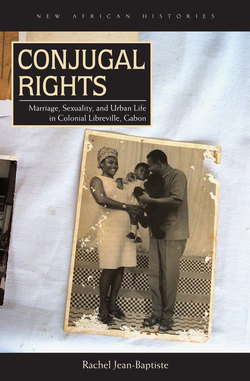Читать книгу Conjugal Rights - Rachel Jean-Baptiste - Страница 9
На сайте Литреса книга снята с продажи.
ОглавлениеAcknowledgments
I received tremendous financial, intellectual, and emotional support from varied institutions and people in completing this book. Fellowships from the Andrew W. Mellon Foundation, the Department of Education’s Foreign Language and Area Studies Program, and the Fulbright Program supported fieldwork and writing of the dissertation from which this book sprang. The Mellon Mays Fellowship Program has funded varied stages of research, writing, and a sabbatical year. An Individual Development Award Grant from the United University Professions at the State University of New York at Albany funded follow-up research in Gabon and Senegal. The University of Chicago’s Social Science Division provided a year of leave and funding for further research trips to France and to Italy. The office of the Dean of Social Sciences provided funding for the stage of final production.
While a graduate student at Stanford, I was fortunate to be part of a dynamic community of faculty and peers. The indefatigable Richard Roberts has been a generous adviser and mentor for more than a decade. The late Kennel Jackson conveyed his love of African cultural and art history. Mary Louise Roberts taught me to not be afraid of theory, and Estelle Freedman taught me to think critically about how gender matters. Fellow graduate students Shelley Lee, Carol Pal, Lise Sedrez, and Matthew Booker read nearly every word of every chapter and continue to provide a sustained friendship. I have also benefited from commentary by Kim Warren, Cecilia Tsu, Shana Bernstein, Shira Robinson, and Amy Robinson, as well as Emily Burrill, Benjamin Lawrence, and Rachel Petrocelli. Abosede George has provided invaluable feedback along the entire road from dissertation to book.
At the University of Chicago, I found myself amid a remarkable intellectual community of scholars. I thank Adrienne Brown, Tianna Paschel, Micere Keels, and Gina Samuels for reading several chapters in a critical moment of transition and for their friendship that knew no bounds. Leora Auslander’s keen discernment propelled me in new directions, as did the insights on the changing meanings of race provided by Julie Saville, Kathy Cohen, and Daniel Desormaux. Linda Zerilli and affiliated faculty and students of the Center for the Study of Gender and Sexuality commented on several chapters. Ralph Austen, Jennifer Cole, Jean Comaroff, John Comaroff, Keisha Fikes, Cécile Fromont, Emily Osborn, Francois Richard, and graduate students who participated in the African Studies Workshop formed a tremendous gathering of Africanists. Research assistants Deirdre Lyons, Brittany McGee, and Jennifer Amos tracked down numerous leads. I learned much from undergraduate and graduate students in the classroom.
Many individuals beyond these institutions generously gave of their time and intellectual capital. I thank Jean Allman for meticulous criticism and probing questions. Gillian Berchowitz supported this project with patience and encouragement. Two anonymous reviewers provided valuable critiques. Carina Ray and Kahleen Sheldon read several chapters in varied stages. The book benefited tremendously from Michelle Beckett’s close reading and editorial suggestions and Nora Titone’s sharp eye for detail. Hilary Jones and Lorelle Semeley have conversed with me innumerable times about our mutual interest in historical change in Francophone Africa. The small community of scholars who work on Equatorial Africa—including Florence Bernault, Phyllis Martin, Jeremy Rich, John Cinnamon, Marissa Moorman, Meredith Terretta, and Kairn Klieman—has provided me with immeasurable assistance in obtaining access to archives, people, and institutions. In France, Pascale Barthélémy, Anne Hugon, Odile Goerg, and Catherine Coquery-Vidrovitch have been generous colleagues. At the State University of New York at Albany, conversations with Patricia Pinho, Glyne Griffith, and Lisa Thompson pushed me to think more critically about the analysis of race, and I have benefited greatly from Iris Berger’s insights and mentorship.
I am grateful to and profoundly thank the men and women in Gabon who generously shared the most intimate details of their lives and hosted me in their worksites, homes, and sacred spaces. Jean-Emile Mbot and the Laboratoire Universitaire des Traditions Orales at the University of Gabon Omar Bongo provided me with institutional affiliation. Soeur Marie Sidonie and Soeur Maria Cruz of the Congrégation de l’Imaculée de Castres assisted me with transportation and introductions to social networks. Guy Rossatanga-Rignault and the Fondation Raponda-Walker pour la Science et la Culture also facilitated access to key documents and people. Patrick Cellier shared his treasure trove of historical postcards. The staff of the National Archives unearthed uncataloged documents and photographs. The company of Brigitte Meyo, Achille de Jean, Judy Knight, and many Haitian expatriates helped to make Libreville a home away from home.
I thank my family and friends for their love, patience, and encouragement during this long journey. Marsha Figaro and Erica Olmsted have been tremendous friends. My parents, Christie and the late Aramus Jean-Baptiste, and Ari, Sara, Pria, and Noah Jean-Baptiste provided me with sustenance beyond life in the academy. Cassandra Jean-Baptiste, whose life has unfolded within the shadow of writing this book, and Glenn Hoffmann formed the emotional community that nurtured the completion of this project.
MAP I.1. Gabon
